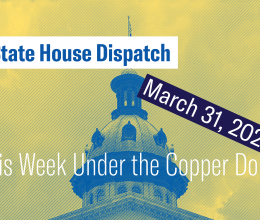
Episode 5: The Legislature and Its Discontents
May 9th, 2024, marked the end of a two-year legislative session in the South Carolina State House ... sort of. On this episode we dig into the bad bills that passed, the bad bills we stopped, and how we can fight back against a legislature that’s increasingly hostile to civil liberties.
One bill that is still live in the legislature is the classroom censorship bill, H. 3728. If you would like to join the more than 600 South Carolinians who have written to the conference committee members asking them to stop this censorship bill, you can do so at aclusc.org/censor24
If you would like to take one small action to end partisan gerrymandering today, we have more information and a petition you can sign at aclusc.org/fairmaps
Music credits: A Spot on the Hill, Daft Hartley
Transcript
STATE HOUSE AUDIO: Mr. Speaker, it is now 5 p.m., and pursuant to the provisions of the Sine Die resolution, I move that the House do now adjourn.
Ms. Felder moves that the House do now adjourn under the dictates of the Sine Die resolution. All in favor signify by saying Aye. All opposed -- the Ayes have it. We are adjourned Sine Die.
PAUL BOWERS: Welcome to episode five of While I Breathe, a podcast production of the ACLU of South Carolina. I'm your host, Paul Bowers. May 9th, 2024 marked the end of a two -year legislative session in the South Carolina State House ... sort of. May 9th is what we call Sine Die, which is a fancy Latin phrase that basically means the legislature is adjourned without a set return date.
Although we know lawmakers will return to Columbia in June to vote on the budget and a few other loose ends. I'm not the best equipped person to explain all that, or even the best equipped to pronounce "Sine Die" correctly, which is why I've asked three of my brilliant colleagues from our advocacy team to join me today.
As a quick programming note, I initially planned to do a combined episode with members of our legal team who are raring to go for a conversation about gerrymandering and how it erodes our democracy while fueling extremist politics under the State House dome. However, the advocacy team just had so much ground to cover and so many thoughtful things to say, I decided to split that conversation off into a separate episode, which we will be releasing shortly. So stay tuned for that. And in the meantime, get used to hearing the word gerrymandering. It's a strange, ugly word, and it's at the heart of so much of our political dysfunction in this state.
If you'd like to take one small action today, we have more information and a petition to end partisan gerrymandering on our website at aclusc.org/fairmaps. Again, that address is aclusc.org/fairmaps.
Okay, enough from me. Let's talk State House business.
Well, I am joined by our lovely advocacy team, some of the hardest working people I know. So thank you all so much for taking the time to review this legislative session. For starters, for our audience, I was wondering if you could just introduce yourselves.
JOSH MALKIN: Hi, yeah, my name is Josh Malkin. I use he, him pronouns. I'm the advocacy director for the ACLU of South Carolina. And I'm privileged to be at the state house with my two colleagues. And when we are not at the state house, we try to be out with community as much as we can be.
COURTNEY THOMAS: My name is Courtney Thomas. My pronouns are she and they, and I'm the senior advocacy strategist. I'm the new kid on the ACLU South Carolina team, and I'm excited to get started.
MATTHEW BUTLER: My name is Matthew Butler. I use he, him pronouns. I'm the LGBTQ advocacy strategist with the ACLU of South Carolina.
BOWERS: Josh, to get us started, I was wondering if you could tell us where we are in this legislative session. It's a two year session, 2023 through 24. Where are we? Are we out of the woods yet?
MALKIN: I think that those of us who live in the woods never truly get out of the woods. But I will say that the quote unquote normal session did end last Thursday, May 9th, I believe. And we are now in what is called like the sine die period. It is an extended period of session.
They can only take up a limited number of things, which include conference committees, judicial appointments, and just to very quickly define what a conference committee is, because I imagine that might come up later: A conference committee is convened when both the House and the Senate pass different versions of a very similar bill. So when that happens, three senators, three representatives are brought together to form a conference committee in hopes that they can reach a compromise that they then bring back to their respective chambers. But for the most part, the chaos of the every Tuesday, Wednesday, and Thursday of normal session is over.
BOWERS: My blood pressure is a little lower already. I know I'm not there on the front lines, but I did breathe a sigh of relief. I allowed myself that on May 9th. Courtney, you introduced yourself as the new kid, although you're not giving yourself enough credit. You're not new to South Carolina. You're not new to the workings of the state house. Still, you know, you started this job in what, April, and you just dove straight into the fray. I saw you there, I think in the first week you worked a punishingly long day. You were there for just the thick of it. I was wondering if you could share your impressions of the state of the state house. What have you observed these last few weeks in the session?
THOMAS: Yeah, goodness. I would like to say that the legislature rolled the red carpet out for me, but they did not. I came onto the team right as we were in the thick of some of our most difficult fights, especially around the gender affirming care ban that I'm sure we'll talk about later. And my experience of the state house before this moment was that of an advocate. You know, I'd show up at the state house, maybe testify at a hearing or two, but I hadn't really spent that much time in the lobby. So being able to not just observe, but engage in what happens, you know, in the capital lobby is very different than I think what a lot of regular folks in South Carolina would expect. There is frankly, you know, a lot more wheeling and a lot more dealing than you'd think. And it's really interesting to see how some of the big decisions that govern our state actually don't happen in the chambers. They might happen in a meeting room. They might happen in a conference room. They might happen in a hallway.
So that's something that I think a lot of folks don't get to see. And I feel really privileged to see. But I also realize that as an everyday advocate, I feel like it's part of my charge to bring people into that space. So to let folks know that, yeah, it might seem a little secretive, but I think part of my role here is to bring other people into that space. So that's been my experience so far. They did not throw a parade, Paul.
BOWERS: That wasn't for you? I saw all the ticker tape.
THOMAS: It was not. that was for Thee Dawn Staley. That was for her. Yeah.
BOWERS: Well, well deserved. But you'll get your parade one day. Matthew, I turn to you because when I'm trying to explain the work that our advocacy team does, a lot of times the example I'll give is your work alongside drag artists from all over South Carolina. The last two years, you've been working with them to push back against the House Bill number 3616, the Drag Performance Ban. I was wondering, could you tell me a little bit about that bill, the work you did, and the results you saw?
BUTLER: Sure. So, you know, the cleverness of our state legislature, they entitled that bill the protection of children's innocence. The bill would have barred any drag performances, and they gave a list of exactly what that meant, specifically what drag show meant, from happening on public land. So say goodbye to drag performances at pride parades and pride events on public property, or events like the Bird Cage at the University of South Carolina, which is a very long-standing, over 20-year show of drag performance at the university, as well as really punish folks who own business and allow drag performances on their property, if a child should, let's say, walk down the street, look into the window and see something, see a performance. And the bill really would have made things kind of difficult and tough. I mean, there were fines in place, including some potential stints in jail.
I definitely worked with the drag community and the LGBTQ community at large. We were very fortunate. This bill was filed in 2023, so the first year of a two-year session. We managed to prevent it from getting a hearing at the Judiciary Committee, which is the committee it was assigned to in the House. Last summer, we were concerned because the bill started gaining additional sponsors. You go through the list of sponsors and you see some familiar names from the South Carolina Freedom Caucus. And even as late as January of this year, you saw folks add themselves as sponsors. Again, though, from what we've seen in other states and perhaps because the attention was on the gender -affirming care ban in addition to seeing court challenges and stays being issued regarding drag bans as a fundamental violation of First Amendment rights, you know, again, this bill was not taken up this year. So this bill for this session is DEAD.
BOWERS: Yeah. Ding dong. You know, I don't want you to deny yourself credit. I mean, the organizing work you did there resulted in a petition getting over a thousand signatures and yeah, I just think it's a great example of how your team works in that it's not just you in the state house. You travel all over the state, you work in the lobby, you do this work, but you bring other people in. And, you know, we, we, we have this great sort of team of drag performers all over the state who now have a little bit of knowledge about how to advocate for themselves and their profession. You know, we saw people like the great Miss Patti O'Furniture out there handing out palm cards, asking people, hey, will you please sign this petition? It means a lot to me. This is what I do. This is my art. I just think the work that you do is multiplied when you bring other people in alongside you.
BUTLER: Well, that's kind of the brilliance, I think, Paul, of our model here at the ACLU of South Carolina, because we're advocacy strategists. Josh said it earlier. When we're not in session, we're in community. And by being in community, we're bringing concerns, we're educating folks about what's going on in the state house. They're educating us about what's happening locally. We're engaging in a reciprocal manner with folks where they live and here in Columbia and engaging them in the process. And it really lifts up community. It lifts up folks and I think gives them hope and pride in the fact that they can be a part of the process when so many people look at the machinations of the state legislature and just see a cloud of what the heck is it and don't really know how to get involved. So that is like, I think one of the core tenets and like values and things that should be lifted up here with our advocacy team is that we are so involved in the community.
This is how we get folks to the state house. This is how we get ourselves involved at the local level, at school boards, et cetera. But yeah, really proud of what the drag queens did. I don't think they would mind me saying that working with the drag community is like herding cats. They all know it. Everyone has their own schedule and their own priorities and, you know, pageants and whatnot. And, you know, time is a precious commodity. But I was really proud to see all the kings and queens and things come together to advocate within the community, to help lead charges and sending messages to state legislators. And again, you know, we saw this bill, you know, it's dead. And so it's my hope that, you know, through that particular work and especially seeing what's going on around the country with other jurisdictions saying again and again and again and again, this is a First Amendment right that maybe, maybe it'll sink in to the majority of the state legislature that this is not something that they need to touch. I'm sure there will be some outliers, but you know, we will stand in the breach again if they happen to bring it up one more time.
BOWERS: Well, speaking of bills that are DEAD dead, Josh, I wanted to ask you to share some more good news from this legislative session before we get into the bad news. You are not always our resident ray of sunshine, but I'm forcing you to talk a little bit about the things that we were able to stop, the things that got stuck in committee that didn't make it to the governor's desk. What are some things that we were able to stop that are cause for celebration here?
MALKIN: Yeah, what an unusual posture for me to be our good news guy. I will say, yeah, I will say like people, and this is the nature, an understandable nature of the beast. Like the average South Carolinian has a job, they have kids, they have bills to pay. They don't understand what's going on at the state house. So when you talk to folks from South Carolina and from other places, they have this preconceived notion of South Carolina and they say, the drag ban must have passed in South Carolina. It passed in Tennessee. It passed in Texas. So yeah, it is great to be able to highlight the bills that passed all around us and did not pass in South Carolina. So chief amongst those is the attack on diversity, equity and inclusion at our institutions of higher learning. And I just want to give a shout out to our professor friends. They did an amazing job, both educating legislators and advocating. And that bill died without ever getting a hearing in the Senate.
Further, there was this, I mean, we read so many unhinged bills, but this was a bill that really went under the radar. It was Senate Bill 154. And by my reading of the bill, you could have had one person resist arrest at a USC football game and everyone could have been arrested. It was just the most absurd language I'd ever seen in a -
BOWERS: This one, the way it was pitched was an anti-racketeering bill, right? It was supposed to be about gang activity?
MALKIN: Exactly. Yep. And it was any three or more people standing together in the same family, wearing similar clothing, with similar tattoos. I will give legislators credit. They have so many bills in front of them. They don't have time to read and research them all. I don't blame them for that. But when we got up to testify and said, hey, you have 10 Gamecock fans standing around and one of them steals a pack of gum, you've potentially got 10 people getting arrested. So luckily our legislators were able to see the complete irrationality and poor wording of that bill. And that bill died on the Senate floor.
There were a handful of our bills proposed, you know, driven by the election denialism sentiment. That was quite a room to be in. Any legislator can file any bill they want, right? So like there are bills that folks never hear about because they never get a hearing, but two of those bills that got filed and are really troublesome and I, you know, we'll need to get ready for next year are a ban on no-fault divorce. So currently when you are someone who gets married, you, you know, my understanding is you sign a wedding certificate and then if the marriage isn't going well, you can file for divorce. What banning no-fault divorce would do would at the time you get married, you would have to list the reasons for which you'd be comfortable getting divorced. And if you are not seeking a divorce for one of those reasons, you cannot get divorced, right? So in this journey of how we are controlling bodily autonomy, this is a very scary next potential step that folks can get trapped in unhappy, abusive marriages.
Another one of those bills was a bill that would mandate that the 10 Commandments be posted in every classroom. I'm also a lawyer, and the current legal test for the separation between church and state, I know this probably seems like a pretty obvious violation to most people. Well, the current test is coercion, knowing that these legislators the way I do and the way they feel about certain things, right? If I'm a teacher and I have a Gamecocks poster up and I am a Clemson parent, I am sure that I'm going to make some noise about that. So you just can't say that having a 10 Commandments poster up in your classroom is not coercive. The public classroom is no place to have religious doctrine posted.
Again, just because a bill died this year does not mean it isn't coming back. We know who these forces are out there. They are persistent. They are relentless. They are extremely well funded and well connected. So I hope, Paul, I'm glad that I got to end on that cynical note because I am super uncomfortable being the good guy.
BOWERS: You know, we can celebrate along the road, but we're never at the end of the road. Accept these congratulations. We stopped them for now.
On that note of bills that get reintroduced year after year, even after they fail, one thing that we've seen year after year is attacks on transgender people through the law. So some of these bills, you know, they are campaigns that have been in the works for a decade and they've been rejected again and again by South Carolinians, by doctors, by the leading medical associations, but they keep trying. And one bill that I saw the team fighting hard against this year was House Bill 4624, which is the ban on medically necessary health care for transgender youth.
Matthew, we're recording this as of today. It's May 15th. So with the caveat that, you know, the governor may take action by the time we publish this episode, could you just give us a quick rundown of what's in that bill and where it stands today?
BUTLER: Sure, Paul, and, yeah, at this moment we know that as of yet the governor has not signed that bill. But H 4624, I just want to take a moment and say through the advocacy of this organization, through the advocacy of many of our partners, South Carolina is state number 25, one of the last states in the Southeast that's actually passed this. So I think it's very important to point out the fact that it's taken the majority and let me clarify and say the super majority. It has taken the super majority quite some time to actually overcome our oppositional efforts to get this bill passed. And I think that that says something as a testament to the tireless activities of our advocates, of our community members, of the many parents across the state, of the many medical providers and mental health clinicians across the state, amongst the many members of the LGBTQ community who have shown up at the State House. I think that it's a testimony to the efforts that all of us have made that it took two years and this final, literally the final day of the legislative session, literally the final day for this bill, to come to fruition and pass. It's unfortunate.
What the bill does, it bars anyone under the age of 18 from receiving cross-sex hormones or pubertal blockers. There were some last-minute amendments done in the Senate before it was sent back to the House. Those last -minute amendments did expand the list of folks who have access to puberty blockers. We can come back to what that potentially means in a bit to, you know, to expand beyond the folks who just are precocious puberty, as well as cross-sex hormones to folks who have additional conditions. But if you are a gender-dysphoric child in South Carolina, unfortunately, when this law is passed, if it's passed, if the governor does sign it, kids under 18 will not be able to receive puberty blocking drugs or cross sex hormones.
BOWERS: I know that, yeah, initially this bill was targeting people under 18. And it also includes some provisions about, you know, requiring certain school employees to out their students to their family members. But we also know that the way this bill is written could affect some adults and prevent them from receiving care, right?
BUTLER: Absolutely. So there's explicit language that says that, you know, the South Carolina Medicaid program shall not reimburse or provide practices prohibited under the provisions of this chapter. And public funds may not be used directly or indirectly for gender transition procedures. So this will have a direct impact on state employees, folks and families of state employees who receive insurance coverage through their government employer.
It also has potential to impact folks who go to doctors and hospitals that are on public land or who receive majority of their funding or a portion of their funding from state government. There's issues and concerns about commingling of funds. It's a pernicious law and one is very poorly written. It's an abysmal law and it's abysmally written. But that is where we are currently. And you said it, there's also the second, what I call non-germane part of the law, which is where it directs school employees to basically out kids to parents. You know, we're talking about a population, Paul, and I'll stop here in a minute. We're talking about a population. This is like a minority of a minority of a minority of folks. And when you consider the parents and the families that actually are supportive of their children, it's an even smaller, smaller group of people. So this is talk about government overreach and big government. It's just ridiculous.
MALKIN: Just to trans South Carolinians and parents and family members of trans South Carolinians, I am so unbelievably sorry that we are here. Please know that this office will never stop standing in front of you, beside you, behind you, wherever you want us. And I know that you all are able to find joy in the darkest of moments. So we all look forward to being around the state with you in June as we tear up and have a joyful Pride month.
BUTLER: Thank you. Thank you. Thank you, Josh. I'm sorry I went to a dark place there, but you brought it back. And that's absolutely right. We will be with these families and with this community thick, thin, no matter what, and, and whatever capacity we need to be.
THOMAS: Josh, you're able to break your rain cloud reputation when it really matters for trans kids. And we love that.
BOWERS: Listen, there's no rainbow without a rain cloud.
BUTLER: Absolutely.
BOWERS: Yeah. Thank you. Thank you for sharing that. And I got to see y 'all at some of these hearings throughout the first half of this year, and day one of the, of the return of the legislature in January, you know, we sat through this long hearing about this bill where every single South Carolinian who spoke was opposed to it. You know, there was one person who called in on a Zoom call from out of state to support it. And we have to spend a lot of time playing defense on bills like this. But when you sit next to and have meals with and get to know the families who are being targeted, you understand why we have to fight so hard.
BUTLER: Yeah, Paul, I just want to say something about that day. What an incredible day. 48, over 48 folks were allowed to speak. There were more that wanted to speak. We came out from across the state, huge, huge shout out to all of our folks in Greenville, Beaufort, the coast, who came during a tornado. Just prior to that, to that hearing, there was a big press conference where you had all these folks saying, you know, protect our kids. Where did those people go? They ran for the hills. Our people stayed. They don't really mean it. They don't know what they're talking about. Our people stayed. The families stayed. The families spoke. They spoke eloquently. They spoke passionately. They had members in tears, had members in tears because of the reality and the truth that they were speaking to power. And sadly, the agenda of the majority was forced upon them. But that was an incredibly powerful day and was a moving day to be with so many amazing South Carolinians.
BOWERS: Well, that bill, 4624, has been passed by the House and Senate. And again, as we're recording today, it sits on Governor McMaster's desk.
Hey, it's Paul here adding something in post. Unfortunately, as we were preparing to publish this episode on May 21st, 2024, Governor Henry McMaster signed House Bill 4624 into law. We aren't finished here, but I did want to share this statement from Jace Woodrum, our executive director:
"We stand in grief and solidarity with LGBTQ South Carolinians who are increasingly under attack by our own government. We can put to rest the notion that the governor cares about limited government or personal freedom. With the stroke of a pen, he has chosen to insert the will of politicians into healthcare decisions, trample on the liberties of trans South Carolinians, and deny the rights of the parents of trans minors."
Josh, let's turn to you to talk about censorship. When I'm introducing you to people, I usually tell them that Josh has been to more school board meetings in more counties than anybody I know, because you show up to fight school censorship and library censorship wherever it happens in the state. But we've seen this bill these last two years, it's House Bill 3728, that introduces censorship codes in kindergarten through 12th grade classrooms. So that one, as I understand it, is in a kind of peculiar position. It's one of those things that could still be debated during this limbo period of sine die. Tell us where things stand. What's the news on that bill?
MALKIN:Yeah. And Paul, if I could first make a plea to school boards around the state: Please have your public comments in the beginning because as much as I like hearing about your budgetary needs, that is not why I am there. And I would really like to get out of there after telling you why banning books is unconstitutional.
BOWERS: I think we listened to about an hour and a half of budget talks in my home school district in Summerville a little while back.
MALKIN: Yeah, which, you know, it's important, but, you know, we had something else to talk about. It's what school board meetings should be.
BOWERS: Yeah, right. Right.
MALKIN: Yeah. The censorship bill. So to get to my to my earlier point about folks just assuming that bills have become law, I ran into a professor this morning who, I spoke to her about this bill in the fall of 2021. And she was just like, I assume it's become law by now. I was like, actually, it hasn't. But yeah, here's where we are with with 3728, which is the K through 12 censorship bill.
It is in what I described earlier, it's a conference committee. And as I said, conference committee bills can be debated during this extended session. So yeah, there is a chance that the conference can agree or the chambers don't want anything to do with it. I think a silver lining of there being states that are more eager to pass discriminatory legislation than ours is that we can see the effect of the exact same language when it's become law elsewhere. So for instance, I can tell you undeniably, this bill, if it were to become law, would absolutely be used to attack teachers, to censor and stifle their speech. And it would absolutely be used to attack the teaching of accurate American history. This is the same bill language that prompted Governor DeSantis to say that AP African American studies was illegal in Florida. You know, they're, they're drawing clothing on unclothed animals in Florida. Is that really the model that we are trying to follow?
So yeah, this bill is not yet law. They are next meeting on June 5th. So if you would like to reach out to your Senator, your representative and say, please vote no to house bill 3728. We should be doing everything we can to respect our educators right now. And we know this bill is anything but respectful of our incredibly hardworking and devoted educators.
BOWERS: And that's another bill where we have a page on our site where you can send an email to every member of that conference committee if you like. So again, aclusc.org, scroll down to the bottom and you'll see a little graphic that says Strike out Classroom Censorship. That's where you can go. It's an easy way to connect with the six people in the state who have the most say over this bill right now.
Well, thank you for that update, Josh. Courtney, coming back to you, having watched this session and seen some of the twists and turns, some of the drama that unfolds in the state house, we've watched groups like the South Carolina Freedom Caucus grow a little bit and influence, occasionally infuriate their colleagues, even within their own party. What can you share about groups like that? Where do they come from? What kind of power do they wield in the state house?
THOMAS: Sure. I am always happy to name the actual villains who exist in our legislature. So for folks that may not know, the South Carolina Freedom Caucus is an informal group of legislators in the South Carolina House of Representatives. They're just under like, just under 20 of them from all different parts of the state. They are a group of people who I wouldn't say are interested in governing, they're interested in chaos. So what we saw at the end of this session, particularly the last two days of session that Wednesday and Thursday was a real example of what the Freedom Caucus is and what they stand for, which is truly very little. They are a faction of the Republican Party that, to be super frank with you, Paul, they're pretty well hated on both sides of the aisle. Okay? Their peers in the Republican Party do not like the bills they propose or the parliamentary games they play because they truly are games. These are folks who are on the far, far, far right of the South Carolina Republican Party. And they modeled themselves after a lot of other freedom caucuses around the country. And they have very similar goals to some of the other folks you might have heard of around the country.
So a lot of these folks were championing that awful bill that we just talked about that would ban gender affirming health care and a lot of other terrible things too. They are interested in -- this is by their terms. They're interested in small government. Small government that is just small enough to fit into the doctor's office with you when you want your abortion, just small enough to get into your classroom to block what your kids can read. Government just small enough to prevent you from marrying who you want to marry, love who you want to love, do what you want to do, right? So it's, as Matthew would say, freedom for me and not for thee. These are folks who align themselves with some of the worst parts of our political system. They are taking marching orders from folks from outside of the state of South Carolina and enacting these awful policies that really harm South Carolinians. And I think it's important to understand just how small the Freedom Caucus is, but when there is a super majority of one party, in both the House and the Senate, it only takes a few of the majority party to cause chaos. And that's exactly what they're doing.
So an example of this, there was some parliamentary trickery, some moves that they made, like requiring the full reading of a bill. I forget what bill it was, but essentially it was a stalling tactic to prevent anything positive from happening. They just wanted to gum up the works, slow things down. They also were very, I think rebellious is the word that I want to use in a way that really shocked people on both sides of the aisle. I remember standing in the lobby when there were outright arguments happening at the well, that's the podium where members of the legislature speak. And it's a very formal space. There are rules about how members are supposed to govern themselves, but they're -- we were so close to tears a few times in the final days of legislature. There were lots of big feelings happening, and I'm sure our friends in the Freedom Caucus have not learned how to work through those feelings, so they attacked South Carolinians. It's truly some of the most despicable behavior that I've ever seen in a formal setting. There was a moment in the final Wednesday of session where there was one Republican member who was directly making almost a campaign speech. It felt like I was at a campaign rally because they were talking about things that were not germane or not relevant to the bill that they were discussing, but they were putting on a show so members of their team could take out a clip and put it on social media so they could go viral.
To use the parlance of the streets, Paul, these are a bunch of stunt queens. They love putting on that show. And I wish people could understand that of the games they play, the real harm here is some of the hatred that they say that go into the public record of South Carolina, but also that they are stalling and delaying actually good things that could happen in South Carolina. So they're really not great for government by any stretch of the imagination. So that's my soapbox, Paul.
BOWERS: Yeah, I'll join you on that soapbox. I think one of the first times I really became aware of their stunt queen behavior was last year. There was this bill introduced to designate a certain day of the year as Women in Hunting and Fishing Awareness Day. Just like one of those, you know, whatever, kind of a pretty simple bill. But yeah, members of the Freedom Caucus stood up so they could get their video clip of themselves saying, well, I want to amend this bill to define woman as someone who was assigned female at birth.
And you know, this is the type of thing they do. That was one of the lower-stakes stunts they've pulled. But again and again, yeah, they're doing it for clout. It's a very online group. If anybody really wants to go down the rabbit hole on this, look up the Conservative Partnership Institute, because that is their dark money funnel. As we've said, it's, it's a national organization and, they coordinate at the national level and pull a lot of the same tricks from state to state.
THOMAS: And for people who are represented by members of the Freedom Caucus, I think it's important for us to pay attention because you might think that you are electing a Republican or a member of the majority party, but what they're doing, this is not Republican politics. That's not what they're doing. So it's really due to a lot of the intense, intense partisan gerrymandering that's been happening why you get folks like the Freedom Caucus who have extreme values and goals that are completely counter to what, if you ask just a regular South Carolina Republican, they're like, no, those aren't our people. That's not what we want. There are some folks who have even called it a Republican civil war that's happening right now. There is so much infighting that it's pushing out some of the more -- reasonable Republicans are a dying breed because of that partisan gerrymandering.
This used to be a state where you could get things passed from both sides of the aisle, but because of this kind of pageantry that they put on, it's been a lot more difficult to work in a bipartisan way, which is how government should work.
BOWERS: You're starting to sound like Tish and Alan from Legal, who will talk your ear off about partisan gerrymandering. You know, that's, as you said, that the way the maps are drawn fosters extremism in this state.
BUTLER: The tiger has caught itself by the tail.
BOWERS: We are in the finding out phase, as they say. Well, before we go, I want to mention some of the bills that we were in favor of this session. And in some cases we were able to give testimony and we were able to help people reach out to their lawmakers on these issues. But unfortunately they did not make it across the finish line. So, and these line up with, with our big priorities right now, which are voting rights, housing justice, and juvenile justice reform.
So House Bill 4590 was one that Matthew was able to go speak in favor of; this would have expanded early voting hours in elections in the state. Generally we come out for bills that expand the right to vote, expand access to the ballot. Unfortunately, that did not make it across the finish line.
One that I will talk anybody's ear off about and that I've recorded three podcast episodes about is a bill providing right to counsel for tenants facing eviction. That was House Bill 3844.
Senate Bill 266 was a big juvenile justice bill that would have removed status offenses as one of the tools of the school to prison pipeline. And that one was notable in that the director of the South Carolina Department of Juvenile Justice came out and spoke in favor of it. For all our differences, she stood with us on that. We were in agreement that this would have been a positive change to her department.
Unfortunately, with the bills that our legislature prioritized, with the shenanigans that were pulled that sucked up days and days of debate, we didn't get to these bills. So I do hold out hope for next year. You know, we'll be starting in November, keeping an eye on bills that get pre-filed because next year is another shot to work a positive change in the state.
On that note, before I let you go, I just wanted to open it up to any thoughts that y 'all had on this session, on ways people can get involved, what your thoughts are looking forward to 2025.
BUTLER: It's an election year. And yeah, the districts are gerrymandered to hell and back, but I want to encourage everybody to go out and vote. Vote, vote, vote like your life depends on it. You know, we all tend to pay attention to the federal government and you can see what a circus Congress is. But reality is reality, and the majority of legislation ordinances things that affect your daily life happen in Columbia or at your local municipal and county level. So, you know, if you want to see real and effective change, vote in your state elections, vote in your municipal and county elections and your school board elections. This year is an opportunity for everybody to do that in addition to the the circus of Washington, D.C. But, you know, vote like your life depends on it because as we've seen with the rights of women and the rights of LGBTQ and trans folks specifically, this is not a government that is afraid of trampling directly on your rights and your bodily autonomy as a human being with agency and as a citizen of the United States of America and South Carolina.
BOWERS: Amen. Josh, Courtney, anything from y 'all?
THOMAS: I would just say that it's important for people to just show up. You don't have to be fully prepared when you show up. I can tell you with certainty that our legislators themselves are not prepared when they show up most of the time. So I'm saying that to say you don't have to be perfect if you want to come to the State House and just be in the space because it is yours. It belongs to you. It is not this, you know, opaque, scary place. It is yours. It is quite literally exactly the same as a public park. There's more marble, but I guarantee you it is a place that you can and should be. We're always happy to come hang out with you, take you to hearings. If you want to testify, that's great. But I also think it's important for folks to pay attention.
I know our lives right now are difficult, but I also think it's important for what's happening at the state house and our local governments to not go unnoticed. They need to know that people are watching. And I think that's the power of the ACLU of South Carolina because we are always watching and always getting involved. But this really works when individuals, regular folks, residents of South Carolina get involved. So I think that's the best thing we can do.
And also just staying hopeful because we did say a lot of scary things in this episode, but there is so much more to be hopeful for. And if you need any reminders on why we should be hopeful, just rewind back to when Josh was talking about all the things that we fought against, because as much as we talked about today, there is so much more that could have happened. And I think we were able to continue in this fight because people like y'all show up.
MALKIN: To echo Matt and Courtney, and I'm sure you're about to hear more about this from Tish and Allen, the Republican Party is not a monolith. The Democratic Party is not a monolith. And yet for almost everyone in this state, your actual election is June 11th. Your representation will be decided on June 11th. So know where every candidate stands on the issues that matter to you. And secondly, I think I can safely speak for my team here in saying that we don't enjoy being at the State House and watching folks have their rights stripped away. What we do enjoy is being out in the community with you all. So wherever you are in your advocacy journey, we'd love to come chat with groups this summer. We do travel, we do hit the road. And then in the fall, we do legislative look aheads where we let folks know what legislation to expect in the coming session and how you can advocate against it. And those are really important because if we were to wait until January and the start of session, it would be too late. So it's really important that folks start advocating and educating themselves before session actually starts.
So please for my own, you know, I'm a glass three quarters empty most of the time, but I am a glass one quarter empty when I'm out in communities who care about fighting back. So please, please, please never hesitate to send an email and invite us to come be with y 'all.
BOWERS: Well, thank you all. Thanks for taking the time and thanks for doing what you do. As a lifelong South Carolinian, I have felt real despair about the state of our state and the state of our politics, but one antidote to despair is action. And I see you guys taking action. I see you leading the way. And it makes me feel hope.
Thanks for joining us for another episode of While I Breathe, a podcast production of the ACLU of South Carolina. If you enjoyed today's episode, please tell your friends, tell your cousins, look up your state senator and house representative and tell them too. Coming soon, we'll be releasing a sort of part two to this episode, which will be a deep dive on gerrymandering: who does it, how they do it, and how it's hurting us all.
Music on today's episode is by Daft Hartley and A Spot on the Hill. If you're missing my co-host Jace on this episode, don't fret, we anticipate he'll be back in time for the next episode, so you won't have to listen to me talking to myself in these little intro and outro segments.
Until then, South Carolina, while I breathe, I hope.
Related content

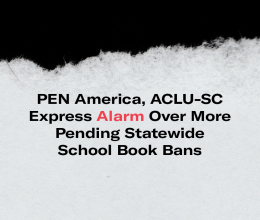
PEN America, ACLU of South Carolina Express Alarm Over More Pending...
March 28, 2025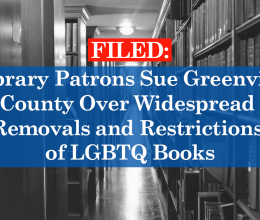
Library Patrons Sue Greenville County Over Widespread Removals and...
March 26, 2025O.R. v. Greenville County
March 26, 2025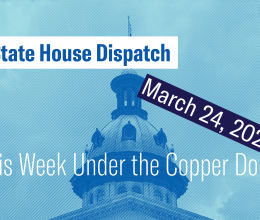
State House Dispatch: March 24, 2025
March 24, 2025
North Myrtle Beach wanted to police musical content. We took them...
March 14, 2025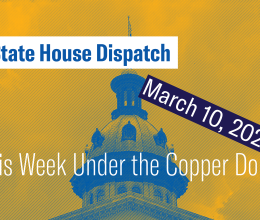
State House Dispatch: March 10, 2025
March 10, 2025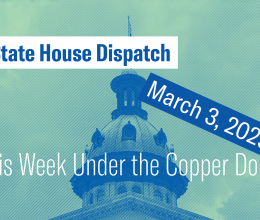
State House Dispatch: March 3, 2025
March 3, 2025
